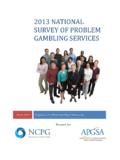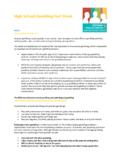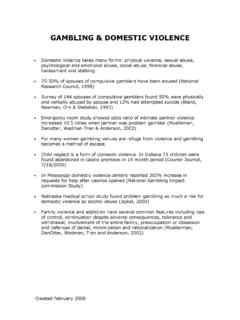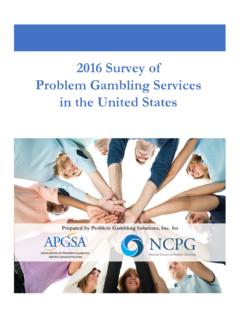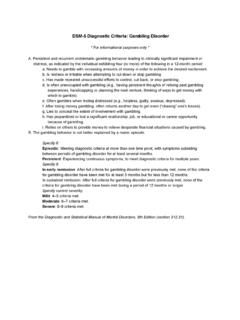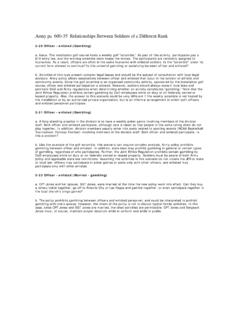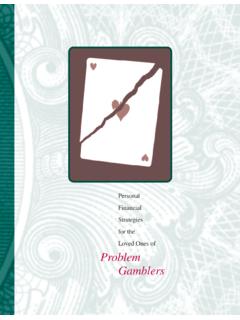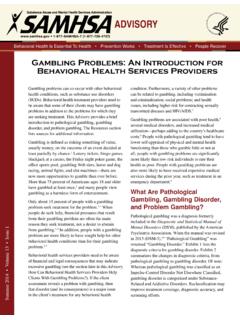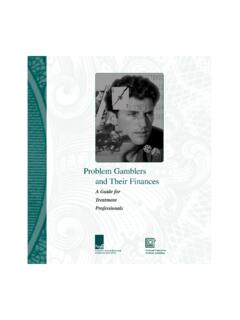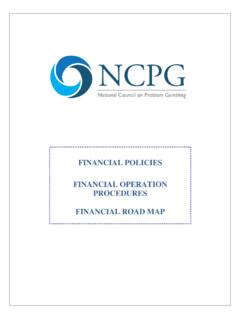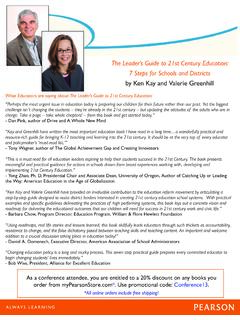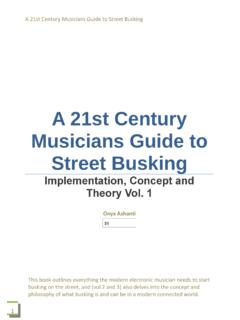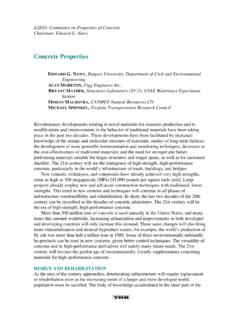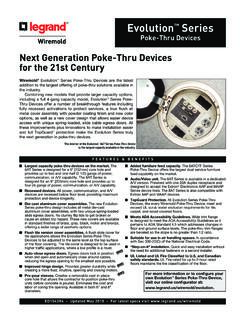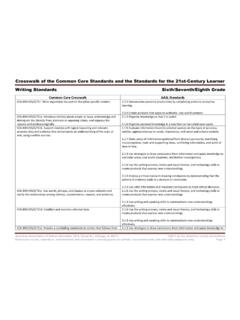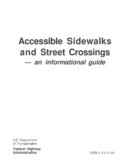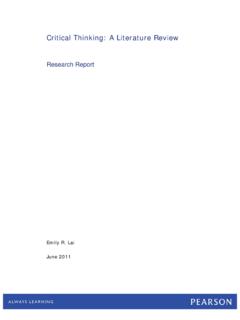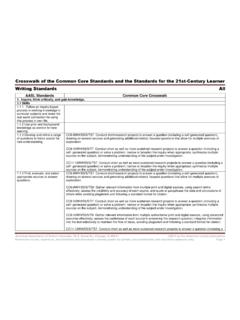Transcription of PROBLEM GAMBLING in the 21ST CENTURY …
1 [Type the abstract of the document here. The abstract is typically a short summary of the contents of the document. Type the abstract of the document here. The abstract is typically a short summary of the contents of the document.] PROBLEM GAMBLING in the 21st CENTURY HEALTHCARE SYSTEMIMPLICATIONS OF THE DSM-5, ACA, AND PARITY FOR PROBLEM GAMBLING TREATMENT & ADVOCACYR aanan Kagan, Keith Whyte, Joshua Esrick and John Carnevale7/3/20143 PROBLEM GAMBLING in the 21st CENTURY Healthcare System CONTENTSI ntroduction ..2 What is PROBLEM GAMBLING ? ..2 The Changing DSM Diagnosis: GAMBLING Disorder ..2 How Common Is PROBLEM GAMBLING ?
2 4 PROBLEM GAMBLING Treatment: It Works! ..4 The ACA & PROBLEM GAMBLING Treatment: An Intuitive Case ..5 How the ACA Covers More People ..6 How the ACA Enhances Benefits: What are Essential Health Benefits? ..6 The Place for PROBLEM GAMBLING Under the ACA ..7 PROBLEM GAMBLING & Behavioral Health Parity Legislation ..8A Roadmap for PROBLEM GAMBLING Advocacy in the New Financing Environment ..9 Prepare for the EHBs Using the Intuitive Case and a Multi-Pronged Approach ..9 Strengthen the Case for PROBLEM GAMBLING Treatment ..11 Establish Concrete Prevalence Data and Support Research ..12 Focus on Special Populations.
3 13 References ..15 INTRODUCTIONS ymbolized by its reclassification within the American Psychiatric Association s (APA) Diagnostic and Statistical Manual of Mental Disorders (DSM), the scientific and clinical community clearly accepts PROBLEM GAMBLING as a clinically diagnosable behavioral health condition with proven, effective treat-ments. With the behavioral health landscape shifting under the Patient Protection and Affordable Care Act (ACA) and the Mental Health Parity and Addiction Equity Act (M2 HPAEA), the changing environment offers an opportunity to further embed PROBLEM GAMBLING within mainstream healthcare.
4 This report examines the opportunities under these new laws and offers recommendations for effective PROBLEM GAMBLING advocacy in the 21st CENTURY healthcare system. WHAT IS PROBLEM GAMBLING ? PROBLEM GAMBLING is GAMBLING behavior that causes disruptions in any major area of life: psycholog-ical, physical, social, or vocational. The term PROBLEM GAMBLING includes but is not limited to the condition previously known as pathological or compulsive GAMBLING (now GAMBLING disorder ), which is a progressive addiction characterized by increasing preoccupation with GAMBLING , a need to bet more money more frequently, restlessness or irritability when attempting to stop, chasing losses, and loss of control manifested by continuation of the GAMBLING behavior in spite of mounting, serious, negative consequences.
5 As used in this report, the term PROBLEM GAMBLING includes behavior that does not meet the clinical definition of GAMBLING disorder (or previous diagnoses) but exceeds the limits of social or professional GAMBLING , causing major life disruptions. Importantly, a single incident of problems associated with GAMBLING ( short-term chasing behavior) may not constitute PROBLEM GAMBLING unless it causes major life disruptions. Though not meaning to limit our discussion to clinically diagnosed PROBLEM GAMBLING , the American Psychiatric Association s (APA) Diagnostic and Statistical Manual of Mental Disorders (DSM) has long been recognized as the standard classification of mental disorders for mental health professionals in the United States, so this report will consider the history of the DSM s classifi-cation of PROBLEM - GAMBLING -related conditions.
6 THE CHANGING DSM DIAGNOSIS: GAMBLING DISORDERP ublished in 2013, the APA s fifth edition of the Diagnostic and Statistical Manual of Mental Disor-ders (DSM-5) recognizes GAMBLING disorder as a diagnosable condition under the category Sub-stance-Related and Addictive Disorders (American Psychiatric Association, 2013). According to the DSM-5, GAMBLING disorder is persistent and recurrent problematic GAMBLING behavior leading to clinically significant impairment or distress, as indicated by an individual exhibiting four (or more) of nine (9) symptoms in a 12-month period. But this characterization represents a departure from previ-ous editions of the DSM, which continually revisits its classifications in light of new scientific evidence.
7 Under the DSM-IV, which governed the APA diagnoses from 1994 to 2013, pathological GAMBLING was characterized by persistent and recurrent maladaptive GAMBLING behavior, grouped under Im-pulse-Control Disorder Not Elsewhere Classified, along with kleptomania, pyromania, trichotillomania, and intermittent explosive disorder (American Psychiatric Association, 1994). But with the publication of the DSM-5, clin-ically diagnosable PROBLEM GAMBLING ( GAMBLING disorder) has been reclassi-fied in light of new scientific evidence, recognizing the link between PROBLEM GAMBLING and substance use disorders (SUDs).
8 The reclassification came as the APA sought to clarify the diagnosis and treatment of GAMBLING disorder, increase its recognition, and improve research (O Brien, 2011; Petry, Blanoc, & Stinchfield, 2013; Rennert, 2014).The APA makes the case for characterizing GAMBLING disorder as an addictive disorder, noting explic-itly that, although some behavioral conditions that do not involve the ingestion of substances have similarities to substance-related disorders, only one disorder GAMBLING disorder has sufficient data to be included in this [Addictive Disorders] section. Furthermore, the DSM-5 justified the inclusion by noting this [Addictive Disorders] chapter also includes GAMBLING disorder, reflecting evidence that GAMBLING behaviors activate reward systems similar to those activated by drugs of abuse and produce Although some behavioral conditions that do not involve the ingestion of substances have similarities to substance-related disorders, only one disorder GAMBLING disorder has sufficient data to be included in this [Addictive Disorders] section.
9 DSM-5 PROBLEM GAMBLING in the 21st CENTURY Healthcare System 45 PROBLEM GAMBLING in the 21st CENTURY Healthcare System some behavioral symptoms that appear comparable to those produced by the substance use disorders. The DSM-5 goes on to explain that other conditions, (like sex addiction ) are not included because at this time there is insufficient peer-reviewed evidence to established the diagnostic criteria and course descriptions needed to identify these behaviors as mental disorders. Of course, a change to the DSM only marks the canonization of a scientific shift that preceded it. Rec-ognition by the DSM requires a body of clinical and scientific evidence.
10 Not surprisingly, a plethora of research has documented the similarities between SUDs and GAMBLING disorder (Frascella, Potenza, & Brown, 2010). After examining clinical and phenomenological similarities, genetic features, person-ality and neurocognitive features, neural features, and the body of treatments, in 2010, one researcher concluded that, existing data suggest a particularly close relationship between pathological GAMBLING and substance dependence (Frascella, Potenza, & Brown, 2010). Beyond the implications for treatment and insurance coverage, the codification of GAMBLING disorder as an addictive disorder within the DSM-5 is also important for its cultural significance.
